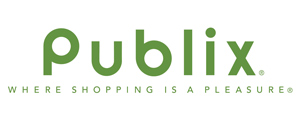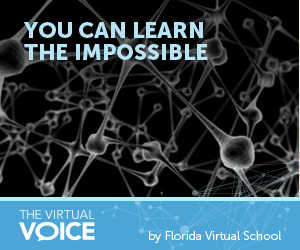Educator Edition
It’s Not What You Know, but Who You Know
By Guest Blogger on September 19th, 2013
 Just a few short weeks ago, all Human Resources employees at FLVS met with our President and CEO, Julie Young, for a focus group discussion. It was an honor just to be sitting in the same room with our esteemed leader, but it was even more of a treat when she actually asked each of us for our opinions on a smattering of pressing matters. Julie got to know each of us, inquiring about our day-to-day likes and dislikes, and intermittently took notes on a notepad while sipping her coffee. Continue reading
Just a few short weeks ago, all Human Resources employees at FLVS met with our President and CEO, Julie Young, for a focus group discussion. It was an honor just to be sitting in the same room with our esteemed leader, but it was even more of a treat when she actually asked each of us for our opinions on a smattering of pressing matters. Julie got to know each of us, inquiring about our day-to-day likes and dislikes, and intermittently took notes on a notepad while sipping her coffee. Continue reading
FLVS: Where Learning is a Pleasure
By Guest Blogger on September 17th, 2013

Photo Credit: Publix.com
Have you ever been inside of a Publix grocery store? No matter what city I am in, I always prefer to go to a Publix if I am in need of groceries. No matter which Publix I visit, I know that I will find a clean store, friendly staff, and fast checkout.
Publix has made it a universal and cultural norm to create a clean, friendly environment in order to live up to its motto “where shopping is a pleasure.” And, it is truly a pleasure to shop at Publix. Continue reading
You Can Learn the Impossible
By admin on September 6th, 2013
 They say the first step is admitting you have a problem, so here goes… I am a brain science junky. Ever since my team started doing research 18 months ago, I’ve been fascinated with the science behind how humans learn. But it’s not just me. I’m seeing the work of Carol Dweck, Paul Tough, Sian Beilock, and Heidi Grant Halvorson show up in all sorts of non-educational publications and places. Sure, I work at a school, so it’s natural for conversations to revolve around grit and growth mindset, but last week I overheard preschool moms discussing it at the supermarket. Continue reading
They say the first step is admitting you have a problem, so here goes… I am a brain science junky. Ever since my team started doing research 18 months ago, I’ve been fascinated with the science behind how humans learn. But it’s not just me. I’m seeing the work of Carol Dweck, Paul Tough, Sian Beilock, and Heidi Grant Halvorson show up in all sorts of non-educational publications and places. Sure, I work at a school, so it’s natural for conversations to revolve around grit and growth mindset, but last week I overheard preschool moms discussing it at the supermarket. Continue reading
Learning Forward – Part 7: Action Research
By Mary Mitchell on September 4th, 2013

Photo credit: http://www.learningforward.org/
Action Research is a professional’s systematic, intentional study of their own classroom and workplace practices. Teachers who collaborate and reflect have a direct impact on student achievement.
This form of professional development takes teachers beyond their own classroom and into each other’s. Action research definitely makes for a great Professional Learning Community (PLC). Continue reading
Academic Integrity: Systematic and Scalable Solutions
By Guest Blogger on August 29th, 2013
For five years, I have been a part of the Academic Integrity (AI) Department at Florida Virtual School. I began as an investigator, researching student violations, and eventually moved into the role of manager. While a primary goal of the AI team is to identify and intervene when incidents occur, we also strive to prevent violations from happening. To do this requires a joint effort between all departments, including Professional Learning, Curriculum, Community Relations, and Technology. Continue reading
Preparing for Rain
By Guest Blogger on August 22nd, 2013
 When people hear Common Core State Standards (CCSS), they immediately fall onto one side or the other in the great debate that is Common Core. Many stakeholders, parents, teachers, and administrators are for it, while many are railing against this large-scale change.
When people hear Common Core State Standards (CCSS), they immediately fall onto one side or the other in the great debate that is Common Core. Many stakeholders, parents, teachers, and administrators are for it, while many are railing against this large-scale change.
What do I think about it? I think at the end of the day, it is change. When it comes to change, no one is truly comfortable. We can believe what we want to believe, but we can’t stop progress and we can’t halt change. Continue reading
Project TAM: Year Zero
By Guest Blogger on August 15th, 2013
 I’ve always been fascinated by the concept of nothing (an idea that is immediately contradicted by having a word assigned to it, which implies something). And, as Project TAM enters what I’ve been lovingly calling “Year Zero,” I find that the centrality of bringing forth something from seemingly nothing preoccupies my thoughts and the thoughts of those around me.
I’ve always been fascinated by the concept of nothing (an idea that is immediately contradicted by having a word assigned to it, which implies something). And, as Project TAM enters what I’ve been lovingly calling “Year Zero,” I find that the centrality of bringing forth something from seemingly nothing preoccupies my thoughts and the thoughts of those around me.
FLVS was recently awarded the Next Generation Learning Challenge Grant to be used for planning and development of Project TAM, a breakthrough school model that will allow FLVS to provide new student-centered, self-paced, mastery-based, and blended learning opportunities. Continue reading
Learning Forward – Part 6: Professional Learning Communities
By Mary Mitchell on August 5th, 2013
Continuing my series on the Professional Learning standards, today’s blog post focuses on Professional Learning Communities. A Professional Learning Community (PLC) consists of educators committed to working collaboratively in an ongoing process of collective inquiry and action research to achieve better results for the students they serve. PLCs are intended to improve student learning by providing continuous job-embedded learning opportunities for educators. A PLC utilizes data to identify gaps between learning goals and actual student achievement. Then, through action research, a PLC develops action items to make corrective changes. Continue reading
Project TAM
By Guest Blogger on July 15th, 2013
Friday found me crying at the copy machine. As I prepared prereading for my trip to San Francisco, the drear of monotonous copies and collating and stapling proved to be an overwhelming prospect for my mind, stuffed full of words like “untethered” and “ideate” and “platforms.” I wondered how this boded for my week — overcome by a copy machine. And, what does “collate” mean for copies anyway?
Sunday arrived not with a roar but a whisper, and by some miracle of heaven Pam and I both arrived at the airport early. I can giggle a little now at us — two travelers traveling together with a common goal, the mutuality of dreams. Dreams which almost prevented these two preoccupied travelers from boarding the plane, so dense were the clouds. Continue reading
The Promise of Prescription in Education
By Guest Blogger on July 8th, 2013
 I see many requests from school districts looking to find the magic pill to make learning tailored to the student. Prescription of learning tends to be a common first step that schools are willing to make into the world of personalized learning environments. In prescriptive learning, a path through the learning content is prescribed for each learner based on a criterion-reference pre-test, and sometimes performance on a post-test. This is a common answer to remediating students who need to make up credits, exempting items they know and remediating on items where mastery has not been gained. Continue reading
I see many requests from school districts looking to find the magic pill to make learning tailored to the student. Prescription of learning tends to be a common first step that schools are willing to make into the world of personalized learning environments. In prescriptive learning, a path through the learning content is prescribed for each learner based on a criterion-reference pre-test, and sometimes performance on a post-test. This is a common answer to remediating students who need to make up credits, exempting items they know and remediating on items where mastery has not been gained. Continue reading



